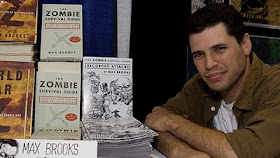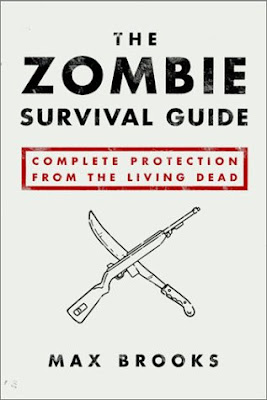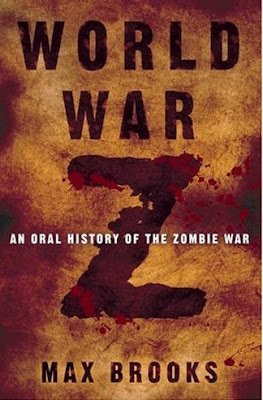
(I interviewed Max Brooks back in 2003 for the first run of The Zombie Survival Guide, which went on to be a huge best-seller that preceded Brooks's zombie epic World War Z. Neither of us knew it at the time, but Brooks was leading the wave of the Zombie Revival Movement that has included hit features like 28 Days Later and "The Walking Dead." There are very few, if any, actual jokes in The Zombie Survival Guide, but it is completely hilarious because for some 200+ pages Brooks never breaks character, playing the book completely straight as an actual practical guide for surviving a zombie attack. And this turns out to be hysterical after about 50 pages or so. You wait for the wink, but it never comes.
Pop cultural zeitgeist-wise, Brooks was pretty damn prescient too. I never would have predicted that what the world really wanted was a lot of zombie movies and shows, but we apparently do.
This article originally appeared in Venice Magazine. As I just watched the finale of "The Walking Dead" tonight, it seemed time to finally get this one up on the blog.)
MAX BROOKS: Zombie Survivalist
With his first book, The Zombie Survival Guide, the comedy writer gets serious about the coming epidemic of zombie attacks. This book may save your life.
With his first book, The Zombie Survival Guide, the comedy writer gets serious about the coming epidemic of zombie attacks. This book may save your life.
by Terry Keefe
Max Brooks is an Emmy-winning writer who spent two memorable seasons on "Saturday Night Live." And he's also the author of a new book which those concerned about their futures had better buy and fast. The Zombie Survival Guide provides everything you need to know to combat the coming rise of the living dead. That's right, according to Brooks, zombies walk amongst us.
The scope of the book and the details it goes into regarding zombies are unprecedented. Brooks has pinpointed the scientific origin of zombies ["a virus known as Solanum]; the safest method of disposal ["Simply put, there are thousands of ways to kill a human - and only one to kill a zombie. The brain must be obliterated, by any means possible."]; the best weapons to use against the undead [Knives are always better than guns because "blades don't need reloading"]; how to organize your house in case of a zombie siege ["Get up the staircase, then destroy it."]; and some helpful philosophy in dealing with a zombie attack ["No place is safe, only safer."] Inside the book are detailed maps and diagrams, everything you need to "organize before they rise," as Brooks has advised.

Because of Brooks' background as a comedy writer and perhaps because his father is the legendary Mel Brooks, many have regarded The Zombie Survival Guide as a hilarious work of fiction, not as a real roadmap to protecting oneself from the living dead. This is something that confounds and worries Brooks. In a letter that accompanies the copies of the book which were sent out to magazine editors, he writes, "For some reason, Crown Publishing has chosen to market this book as a work of 'humor.' There is nothing funny about being attacked and eaten by hordes of undead ghouls."

Despite Mr. Brooks' pleas to the contrary, the questions still persist as to whether the book is to be taken seriously or not. Perhaps it doesn't matter at the moment. If The Zombie Survival Guide is in fact "a real how-to handbook for surviving a confrontation with the living dead," as Brooks has said, then it is an incredibly detailed gift to the human race that future generations should thank him for. If the book is really, in fact, comedy, then it is brilliant and hilarious for exactly the same reasons. Brooks has examined every scenario by which zombies can be dealt with, in as dead-pan and serious a manner as possible. And that makes The Zombie Survival Guide either horrifying or hysterical, depending on how you perceive its intent. We spoke to the author from his home in Manhattan recently.
Max, when did you first discover the zombie problem facing our country?
Max Brooks: If you look for something bad enough, you'll find it.
How did you research the zombie phenomenon? Have you had any zombie experiences yourself?
Well, there's stuff I can't talk about. But there's a lot of information out there and I don't just mean on the web. If you travel outside our borders, you visit different countries, you talk to different people, you really get a sense of what's out there. It's pretty global.
Now, when I studied the chapter on famous zombie attacks throughout history (See the Chapter "Recorded Attacks"), it seems like the events described could have had other causes, not necessarily zombies. Pardon me for being a skeptic, but-
Sure. I think that if you look at each individual case by itself, it could be anything. But when you line them all up and look at all the determining factors, you say, "Now, wait a minute! There are consistencies here that point to a zombie outbreak."
You talk about the possible Doomsday Scenario, of a Level 4 Zombie Outbreak, where the zombies take over the world (See the Chapter "Living in an Undead World"). How likely do you think this is?
I think that's a really good question. I think it's a possibility. I think a case study should be made, with population and transportation as key factors. It's very scary to think that somebody could be bitten by a zombie in the Congo, get on a plane, and literally in a few hours be right here in New York. I mean a zombie outbreak that starts at Lennox Hill Hospital could have originated in Africa.
Have you been training with any of the weapons that you recommended in the book for maximum zombie slaying (See the Chapter "Weapons and Combat Techniques")?
The machete. I'm pretty good with that. I really think that when it comes down to it, you don't need anything more than a machete. My wife is getting pretty good with it too.
Okay, now to some non-zombie questions, because we're fortunately still in the world of the living for the moment. You're a comedy writer who grew up with Mel Brooks as his father. Are there any challenges inherent in that?
Oh yeah, there's tremendous challenges to that. It's weird. I think there's an inherent prejudice towards second-generation kids, that somehow they're making it on their parent's coattails. And that can be in any field. It may not be true, but I think there's often this suspicion about them. Like "Well, you must have gotten this job because your mom or dad pulled some strings." And I grew up with a lot of second-generation kids and there's a lot of that stigma of "If your family wasn't successful, you wouldn't be."
In regards to comedy though at least, I don't think the stigma is fair. Because funny is funny. Or it's not.
Comedy is the purest equalizer. Because you can pull every string in the world, and if they're not laughing, then they're not laughing. I got a little bit of that at "SNL." Not as much as I expected. Maybe there'd be a writer who would say to me, "Lorne Michaels likes you because of your dad." And I would say to them, "Well, then my dad must have run around to everyone in the audience last night and told them to laugh at that joke." [laughs]
That reminds me of the documentary Comedian that Jerry Seinfeld made. He and Colin Quinn are discussing how even if Jack Nicholson, one of the most beloved figures in American pop culture, got up to do stand-up, that he'd only be given a few minutes grace period before the audience started looking at their watches and demanding he make them laugh.
It's funny, [legendary manager] George Shapiro is in Comedian. He's the one that got me "SNL." And that was because of not allowing my father to help me, ironically. I went into meet with him years ago when I was struggling and I wasn't going anywhere. I knew him because he was Carl Reiner's manager. So I said to myself, "Okay, this guy will give me some advice. This guy will know what I'm doing right and what I'm doing wrong. And in the course of our conversation, he asked me where I was living and I said, "Studio City." And he said, "Why don't you live on the West Side?" I replied, "Well, all I can afford is Studio City." He goes, "Really? Your dad's not helping you?" And I went into my whole thing about how if he helps me, that's certainly not going to build my character. George is an old-school guy, and that gave him pause. At the end of the conversation, he asked me, "Do you write comedy?" And I said, "Well, I've been told." [laughs] He said, "Give me some sketches, I'll see what I think." He read them and said, "Okay, I like half of them. I'm going to pass them on to Lorne Michaels." I was like, "Yeah! You do that!" [laughs]
So from an early age you had made a conscious decision not to trade on your dad's famous name.
I've let many an opportunity go. Looking back now, I don't know if that was wise. But when I was younger, I had to prove to myself that I could do it. That's sort of been my whole life-long thing.
Let's get back to zombies, because that, after all, may be a matter of life and death soon. In the book, you recommend that "nothing has saved more people from zombies than wearing tight clothing and closely cropped hair," because the way most zombies attack their victims is by grabbing them. Are you currently wearing the suggested uniform of tight clothes, short hair?
Oh yeah, now. But back on "SNL," I would have been a goner. I was wearing baggy cargo pants and my hair was shaggy. If I had been grabbed, that'd have been the end of me.
Just in time for the impending rise of the undead, The Zombie Survival Guide is now available in bookstores everywhere.

No comments:
Post a Comment